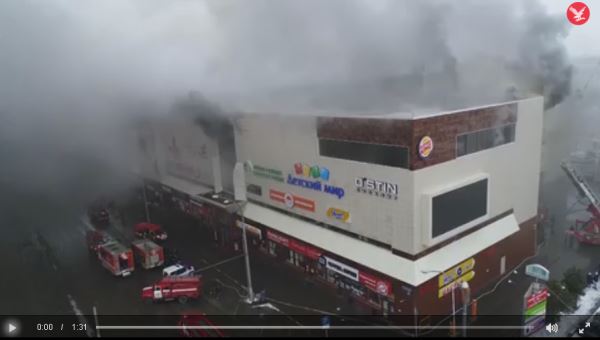Vladimir Putin has visited the city and blamed the deaths on 'criminal negligence, sloppiness'

Fire exits were blocked and the public address system turned off in the Russian shopping mall where a fire killed at least 64 people, officials said.
Forty one children were among those killed in the Kemerovo shopping mall fire, a list of victims made available to relatives showed.
The blaze, one of the deadliest in Russia since the fall of the Soviet Union, swept through the upper floors of the Winter Cherry shopping centre in Kemerovo on Sunday afternoon.
The death toll rose to 64 after firefighters finished combing through the shopping centre’s four floors, the emergency situations minister, Vladimir Puchkov, said.
It was unclear if any people were still unaccounted for.
Thousands of people gathered for hours in Kemerovo on Tuesday, demonstrating outside the government building in the city and accusing the authorities of obscuring the true scale of the disaster.
Amid criticism of the local government, Vladimir Putin visited the scene of the disaster and laid flowers in tribute to the victims. "How could this possibly happen? What's the reason?" he said.
"People, children came to relax. We are talking about demography and are losing so many people because of what? Because of criminal negligence, sloppiness."
Phone messages sent by one of those on the list of victims, 13-year-old Maria Moroz, said: “We are burning. I love you all. This is perhaps farewell.”
Still photo taken from video provided by Russian Emergencies Ministry shows the damage from the fire (Russian Emergencies Ministry/Via Reuters)
Thirteen people were taken to hospital for treatment in the wake of the fire.
The Health Minister, Veronika Skortsova, said those admitted included an 11-year-old boy in a serious condition. The boy had leapt from a fourth-floor window and both his parents and younger sister died in the blaze, Ms Skvortsova said.
Many of the victims will only be able to be identified via DNA testing, officials said.
Some 200 animals are also believed to have died in the mall’s petting zoo. The zoo’s manager told the Tass news agency the animals included rabbits, turtles, pigs, goats and rodents.
Members of the Emergency Situations Ministry work to extinguish a fire in the shopping centre (REUTERS/Marina Lisova)
Russia’s Investigative Committee, which handles major crimes, said it was searching for a security officer who appears to have turned off the PA system when he received a call about the blaze.
Four people have been detained in connection to the fire, including one of the shopping centre’s tenants.
People lay flowers for the victims of the fire in a multi-story shopping centre with the mall in the background (AP Photo/Sergei Gavrilenko)
The investigators did not give a cause of the fire, but said they have obtained evidence proving “flagrant violations” which could have contributed to the heavy loss of life, including the fact some fire escapes were blocked.
The Interfax news agency cited an unnamed local official source as saying the main theory was that the fire had been caused by an electrical short circuit.
However, it quoted Vladimir Chernov, the region’s deputy governor, as saying the blaze started when a child set fire to foam in a trampoline in a play area using a lighter.
Other officials were quoted as saying the blaze may have been started by candles used in a children’s celebration.
Witnesses told Russian media the fire alarm and sprinklers had failed to function and said many people had found themselves trapped because exit doors were locked.
Video footage from inside the centre after the fire broke out showed a group of people in a smoke-filled staircase trying to smash a fire exit door, which was jammed.
People place toys and flowers at a makeshift memorial for the victims of a shopping mall fire in Kemerovo (REUTERS/Konstantin Nagovitsyn)
Alexander Lillevyali and his wife Olga lost all three of their daughters, two of them twins aged 11 and one aged five.
He was cited as saying he had dropped off his daughters at the cinema and one of them had phoned later to say the auditorium was filling with smoke and they couldn’t get out because the doors were locked.
”I was shouting into the phone, telling her to get out but there was nothing I could do — the fire was in front of me,” he said.
He described how he had led rescuers up the stairs, but they had been ordered to go elsewhere and that rescuers, citing rules, had refused to give him a respiratory mask.
“My daughters were left to burn because of their bloody rules,” Mr Lillevyali told Meduza.
Anna Zarechneva, who was on the top floor, where the fire started, was watching a film with her husband and son, said they only found out about the fire when a man ran into the theatre shouting.
“We didn’t hear the fire alarm, they even didn’t turn on the light during the show,” she said. “That movie could have been the last for us, I’ve only just realised that.”
Volunteers queue up to donate blood (STR/AFP/Getty Images)
The Prosecutor General’s Office has ordered all shopping malls in Russia to be checked for fire safety features.
Kemerovo, a coal-mining centre in Siberia, lies about 3,000km (1,900 miles) east of Moscow.
Winter Cherry, which was converted from a former confectionery factory in 2013, was one of Kemerovo’s most popular entertainment centres for children. It had its own indoor skating rink, petting zoo and trampolines.
Locals have brought candles and stuffed animals to the plaza outside the shopping centre, while hospitals in the area reported an influx of people wanting to donate blood for those injured.
Additional reporting by agencies
(independent.co.uk)